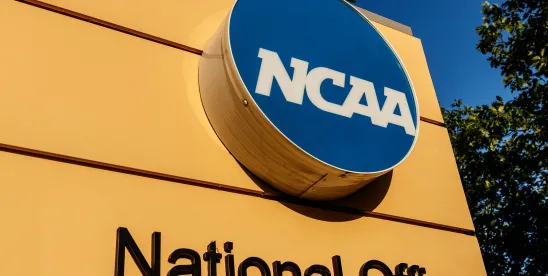The NCAA and the Power Five conferences entered into a settlement agreement (the Settlement) last week in an effort to resolve pending antitrust litigation. The Settlement requires the NCAA and the Power Five conferences to pay almost $2.8 billion over the next 10 years to current and former student-athletes who were prohibited from receiving any revenue from endorsement and sponsorship deals.
Although the exact terms of the Settlement have not been disclosed, the Settlement also establishes a framework for the Power Five conferences to share revenue directly with their student-athletes. Under the proposed framework, the NCAA would allow schools to commit up to $21 million each year to pay student-athletes; however, the cap could rise as revenues continue to increase. Student-athletes across all sports would be eligible for these payments, and schools may decide how to divide the money between teams and athletes. Instead of having scholarship limits on each sport, there would now be roster restrictions. The Settlement must first be approved by a federal judge before it may go into effect, but if approved, schools would be permitted to pay student-athletes directly, a practice the NCAA has strictly prohibited since its inception.
The Settlement aims to resolve a class action lawsuit that was set to go to trial this January. The class-action was brought by former and current student-athletes who allege the NCAA and the Power Five conferences improperly barred student-athletes from earning compensation. The Settlement is also expected to cover two other antitrust cases currently facing the NCAA in the Northern District of California.
Importantly, the Settlement does not resolve all outstanding disputes with the NCAA. Many aspects of the relationship between the NCAA and student-athletes remain unsettled. There are other antitrust lawsuits pending against the NCAA which the Settlement is not expected cover, including the lawsuit filed by the Tennessee and Virginia attorneys general. Furthermore, the Settlement does not resolve the lawsuit which alleges that an athlete is considered an employee of the school. If student-athletes are classified as employees, they could be entitled to a minimum wage, unionization, and other employment-related rights.
The proposed Settlement also leaves many questions unanswered. It is unknown how Title IX will impact the new compensation scheme outlined in the Settlement. It is also unclear where the booster-run NIL collectives will fit within the new compensation scheme, or if the universities will seek to bring all NIL activities in-house. While uniform federal legislation governing college sports and NIL would help to clarify these issues, there are currently no efforts in Congress to enact such legislation.
The landscape of college athletics continues to evolve rapidly.






 />i
/>i

